
President Joe Biden gave "strong" backing on Dec. 9 to Ukraine in its struggle with Russia and urged a diplomatic solution to the conflict in eastern Europe, while promising U.S. help if Moscow attacks.
Ukraine’s President Volodymyr Zelensky issued a statement thanking Biden for his "strong support" in a phone call lasting about an hour and a half.
And the White House said Biden "reaffirmed the United States’ unwavering commitment to Ukraine’s sovereignty and territorial integrity."
Biden also placed a separate call to the leaders of NATO members Bulgaria, the Czech Republic, Estonia, Hungary, Latvia, Lithuania, Poland, Romania and Slovakia, which are all in eastern Europe and deeply concerned by Russian military threats to Ukraine.
They "discussed Russia’s destabilizing military buildup along Ukraine’s border and the need for a united, ready, and resolute NATO stance for the collective defense of allies," the White House said.
Biden had already spent two hours talking to President Vladimir Putin on Tuesday, warning him that if Russian troops now massed next to Ukraine launch a major attack, Moscow would then face U.S. economic sanctions "like none he’s ever seen."
But the White House stressed that Biden, in his calls on Thursday, was also pushing for reinvigorated diplomacy, including the stalled peace talks between Ukraine and Russia.
"Within the next couple days, we’re obviously going to continue talking with our European partners, we’re going to continue talking with our Russian partners and finding a way forward," a senior administration official told reporters.
Western and Ukrainian officials say they fear Russia - which already seized Ukraine’s entire Crimea region in 2014 and also backed a separatist rebellion in the east - is preparing an even larger scale invasion.
Russia says it has deployed troops, estimated to number about 100,000, on the border only out of fear that the former Soviet republic is becoming an outpost of the NATO alliance.
Ukraine is nowhere near to entering NATO, although Washington insists that Russia should not have a veto on Kiev’s ambitions.
Beyond the battlefields of eastern Ukraine, however, the dispute has turned into a much broader struggle over the path for eastern Europe, where for decades the Soviet Union had total dominance but most countries now are part of Western institutions.
At the same time, neither the United States nor any European powers want open war with Russia over Ukraine, and
Biden appears to be seeking a return to negotiations.
Zelensky said that he and Biden "discussed possible formats for resolving the conflict" in eastern Ukraine, where the Russian-backed separatists have a self-declared state.
The senior U.S. official said "we are of course prepared to talk to the Russians about this whole set of issues."
But the official bristled at media reports that Biden had pressured Zelensky into accepting concessions to Russia.
"There very clearly were not" concessions being discussed, the official said, adding that Biden "stood by our principles."
Biden is closely coordinating with major European powers, reaching out to the leaders of Britain, France, Germany and Italy both before and after his session with Putin on Tuesday.
U.S. options for assisting Ukraine are limited, as the country is not in NATO and direct intervention would mean almost certain clashes with Russia.
Still, the United States helps train Ukrainian forces and has committed more than $2.5 billion to bolster a military that crumpled in the face of the Russian assault back in 2014.
Biden said that deliveries of that kind of "defensive capability" would be boosted if the conflict escalates.
The U.S. president says the possibility of sending American troops into Ukraine’s fight is "not on the table." But when it comes to the nine eastern flank NATO countries, Biden is promising the opposite.
"We would probably be required to reinforce our presence in NATO countries to reassure particularly those in the eastern front," he said this week.
Biden and European leaders are also talking up their willingness to impose harsh economic penalties on Moscow over any further Russian attack.
Among them, the new German chancellor, Olaf Scholz, warned of "consequences" for the Nord Stream 2 pipeline, a controversial Russian project to deliver natural gas to Germany.